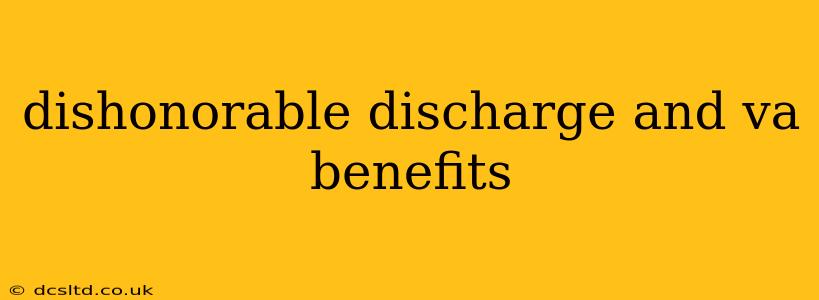Receiving a dishonorable discharge from the military significantly impacts your eligibility for Veterans Affairs (VA) benefits. Unlike other types of discharges, a dishonorable discharge carries a strong stigma and severe consequences, often barring veterans from accessing many VA services. Understanding the intricacies of this complex issue is crucial for those affected and their families. This guide will delve into the specifics, addressing common questions and providing clarity on this challenging topic.
What is a Dishonorable Discharge?
A dishonorable discharge is the most severe form of administrative discharge from the U.S. military. It's reserved for serious offenses, such as desertion, mutiny, or serious crimes, often involving a court-martial conviction. Unlike other less severe discharges (other than bad conduct discharge), a dishonorable discharge is a judgment of character, reflecting a significant breach of military standards and conduct. It's not merely a separation from service; it's a formal declaration of dishonorable behavior.
Can I Get VA Benefits with a Dishonorable Discharge?
The short answer is generally no. A dishonorable discharge almost entirely disqualifies a veteran from receiving most VA benefits, including:
- Healthcare: Access to VA healthcare is typically denied.
- Disability compensation: Payments for service-connected disabilities are unavailable.
- Education benefits: Opportunities like the GI Bill are forfeited.
- Home loans: VA-backed home loans are not accessible.
- Burial benefits: While the VA may still provide burial in a national cemetery, other benefits associated with burial might not be available.
Are There Any Exceptions to the Rule?
While exceedingly rare, there might be very limited exceptions in extremely specific circumstances. These are not common and would require a highly individualistic review of the case by the VA. It’s crucial to understand that successfully appealing a dishonorable discharge is an arduous process with a low probability of success. It requires substantial legal expertise and compelling evidence of injustice or procedural errors during the original court-martial or discharge proceedings.
What Happens if My Discharge is Upgraded?
If a dishonorable discharge is later upgraded to a less severe discharge (such as a general discharge under honorable conditions), this significantly changes the veteran's eligibility for VA benefits. The veteran would then need to apply for benefits and undergo a review of their service record and any related medical conditions. The process can take time, and the exact benefits received will depend on the specifics of the upgraded discharge and the veteran's circumstances.
What Other Resources Are Available to Veterans with Dishonorable Discharges?
Veterans with dishonorable discharges often struggle to access support systems. However, some resources may still be available, depending on individual circumstances and location:
- State and local veteran services: Some states offer support programs for all veterans, regardless of discharge status. Contact your state’s veterans affairs department to inquire about potential assistance.
- Non-profit organizations: Several non-profit organizations provide support to veterans facing various challenges, including those with less-than-honorable discharges. Research organizations in your area specializing in veteran aid.
- Private healthcare options: Although VA healthcare is generally unavailable, veterans may be able to access private healthcare options, potentially through their employer or individual plans.
How Can I Appeal a Dishonorable Discharge?
Appealing a dishonorable discharge is a complex legal process. Veterans should seek assistance from a legal professional experienced in military law. The grounds for appeal are usually limited and must demonstrate significant errors in the original proceedings. Success in such appeals is far from guaranteed, requiring extensive legal preparation and compelling evidence.
Can I get help with my VA disability claim even with a dishonorable discharge?
No, generally you cannot obtain help with a VA disability claim if you have a dishonorable discharge. The VA does not provide disability compensation to individuals with dishonorable discharges due to the nature of the discharge representing severe misconduct that is not service-connected.
This guide provides general information and should not be considered legal advice. Veterans facing this situation should seek professional guidance from a legal expert or veteran support organization for personalized advice and assistance tailored to their specific circumstances.
